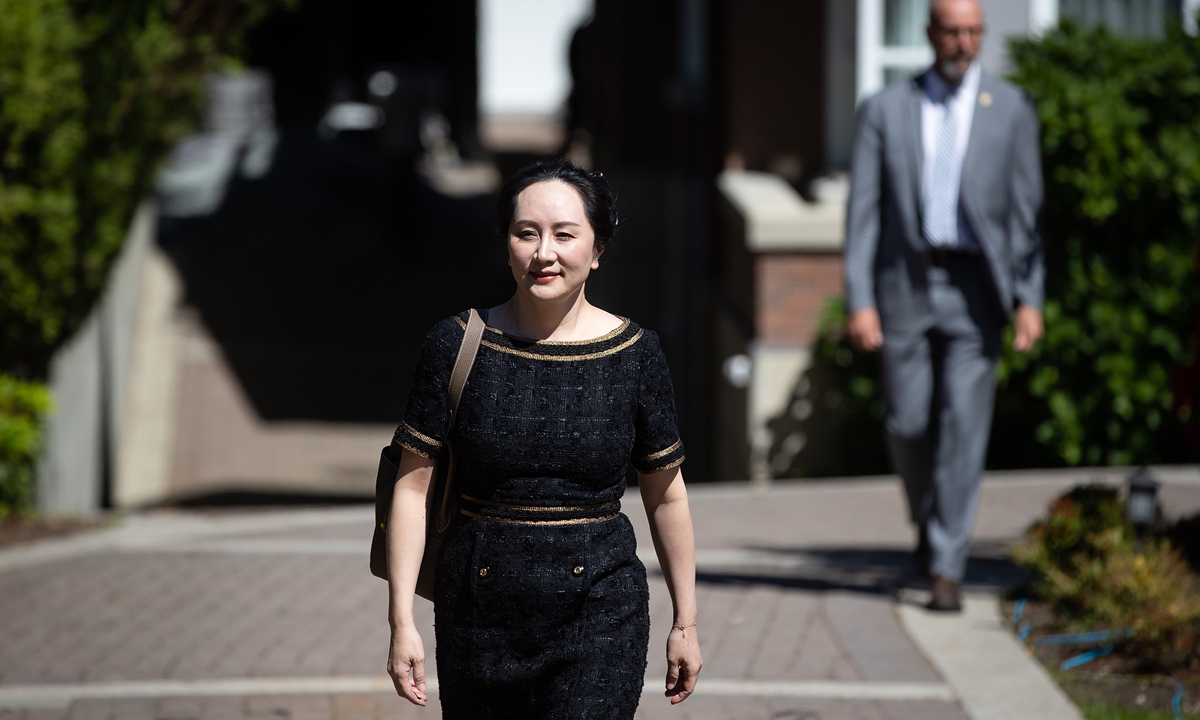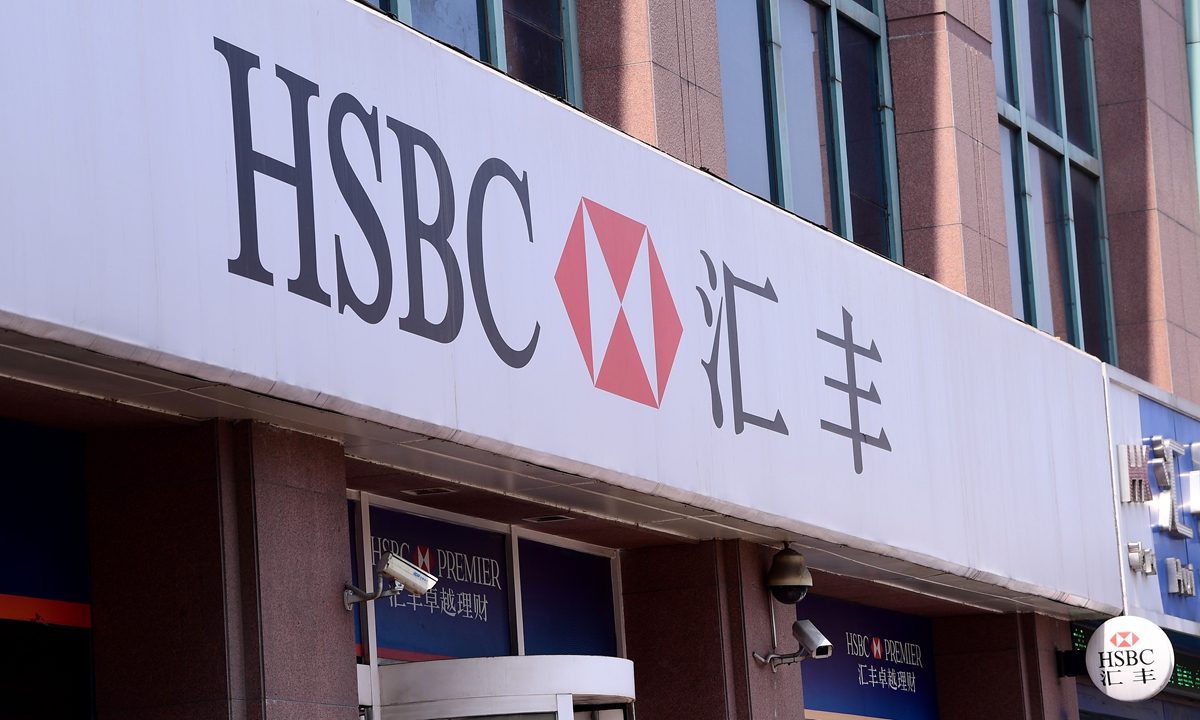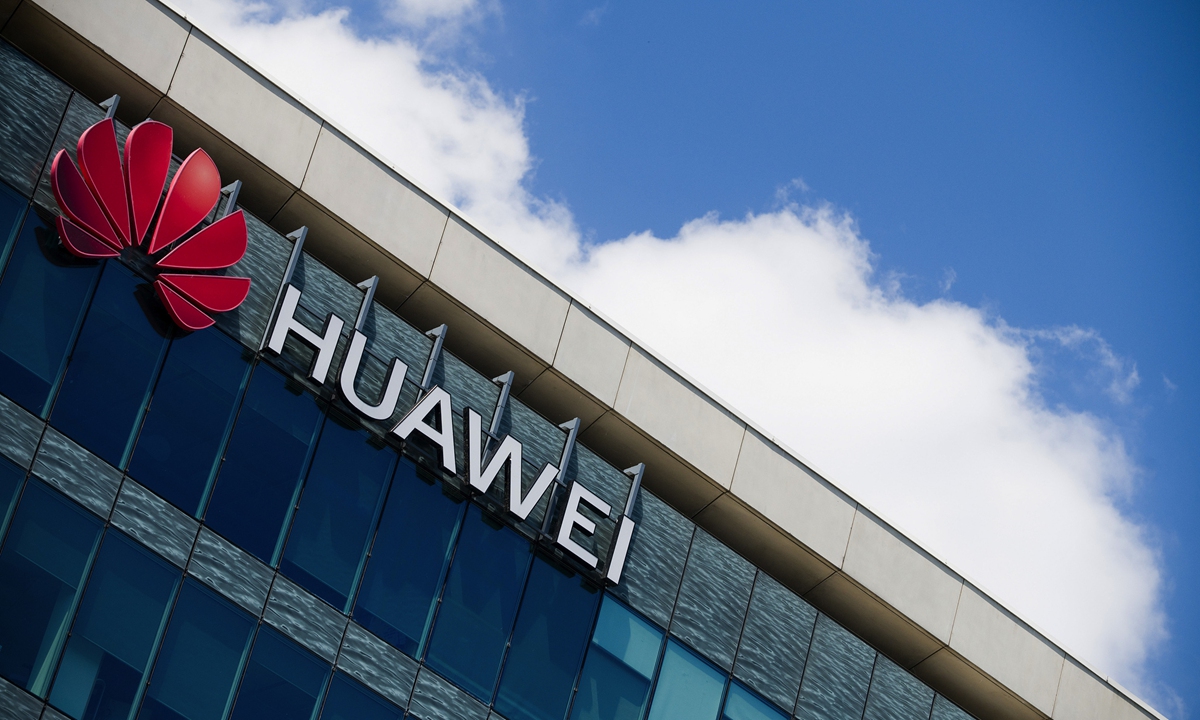HSBC 'accomplice' of US political scheme against Meng Wanzhou, latest disclosures show
By Yan Mu Source: Global Times Published: 2020/7/24 16:47:01

On July 23, local time, the Supreme Court of British Columbia disclosed evidence for the next stage of court hearings in Meng Wanzhou's extradition case. On May 27, the court ruled that the Meng Wanzhou case was, in essence, related to fraud.
The disclosed evidence suggests that Meng's case was masterminded by the US and entirely political in nature. HSBC was involved throughout the scheme, taking actions such as maliciously framing Meng and fabricating evidence. This indicated that Meng is innocent.
The crime was falsified and allegations were groundless
According to the Record of Case that the US submitted to the Canadian court, Meng concealed Huawei's relationship with Skycom Tech. Co., Ltd. ("Skycom"), which misled HSBC into continuing providing banking services to Huawei. Therefore, HSBC violated US sanctions against Iran and faced the risk of civil and criminal penalties. Meng's conduct amounted to fraud.
The only piece of key evidence in this case was a PowerPoint presentation that Meng delivered to HSBC. The disclosed materials included the full text of the PowerPoint presentation and correspondence between HSBC and Huawei. However, it was found that the US deliberately concealed and misinterpreted key information, meaning the allegations were inconsistent with facts.
HSBC was aware of the relationship between Huawei and Skycom throughout the process
HSBC professed that it was unclear about the relationship between Huawei and Skycom, but this was a blatant lie.
Skycom was Huawei's partner in Iran, and the relationship between these two companies was clear. Huawei had held shares in Skycom and Meng Wanzhou had once been on Skycom's Board of Directors for a short period of time. In 2007, Huawei sold its shares in Skycom and in April 2009, Meng left her position as a board member. Since then, the two companies had maintained normal business dealings.
HSBC was aware of Huawei's business in Iran throughout the process, and correspondence between the three parties in 2010 suggested HSBC had been fully aware of the relationship between Huawei and Skycom. According to the 2009 and 2010 financial statements that Huawei sent to HSBC, the bank fully understood Skycom's business operations in Iran.
HSBC attempted to justify their false arguments and make their evidence sound more convincing by claiming that only "junior" employees were aware of the relationship between Huawei and Skycom. The bank went on to say that these "junior" employees did not report the relevant information to "senior" executives. Therefore, these executives could only assess the associated risks based on the PowerPoint presentation provided by Meng.
This rhetoric is simply nonsense.
As the world's largest telecom equipment manufacturer and a Fortune 500 company, Huawei had been the 17th largest customer of HSBC's Global Liquidity and Cash Management Department. In addition to this, the two companies had collaborated for nearly 20 years. Therefore, having a "junior" employee serving as Huawei's account manager would have been unreasonable as well as unbelievable. HSBC pointed its fingers at their own employees, which was neither a reason to exempt them from liability nor an act that complied with the regulations of the banking industry.
It is particularly worth noting that in December 2012, HSBC signed a Deferred Prosecution Agreement with the US Department of Justice (DOJ) due to the bank's own misconduct. This misconduct included violations of US sanctions against Iran. HSBC assured the US DOJ that it would complete remediation in relation to all its group customers. How could it have been possible that HSBC was unaware of the relationship between Huawei and Skycom throughout this process? If HSBC was unaware, then this would imply that they deceived the US DOJ and should be subject to heavy penalties.
The most basic compliance requirement for large financial institutions is "know your customers". HSBC had a dedicated risk management committee and claimed that all of its branches had established compliance departments. If their risk assessment relied solely on Meng's PowerPoint presentation, then why did they have so many compliance staff?
In order to frame Meng, HSBC defamed itself and seriously damaged a reputation that it had cultivated for over a century.
HSBC has never violated US sanctions because of Huawei
Before Meng's PowerPoint presentation, Skycom's HSBC account had been closed, which means that cooperation between Huawei and HSBC on Iran-related business had ended, so HSBC's cooperation with Skycom had never been linked with Meng's alleged fraud. HSBC faced no risk of sanction violations due to the alleged fraud after Meng's presentation, as HSBC had terminated its partnership with Skycom before the presentation was given. Therefore, the claim that Meng misled HSBC into continuing its partnership with Huawei is simply not credible.

Two articles published by Reuters in December 2012 and January 2013 claimed that Huawei violated US sanctions against Iran via Hong Kong-based Skycom. These alleged violations included reselling US-made computer equipment to a telecom operator in Iran.
In addition to Huawei, well-known telecom equipment manufacturers like Ericsson and Nokia have traded in Iran, but these companies have not attracted the same level of attention from the US. The strange thing is that HSBC immediately seemed to smell something was wrong and started worrying about the impacts of Skycom. Therefore, HSBC frequently invited Huawei executives to Hong Kong to talk about related issues.
Both Huawei and Skycom had conducted normal business operations in Iran without violating US sanctions. Even US Commerce Secretary Wilbur Ross admitted that he and his colleagues had found no problems with Huawei. That said, Skycom closed its account with HSBC in February 2013, marking the end of cooperation between Huawei and HSBC regarding Iran-related business.
Despite this cooperation being terminated, HSBC still repeatedly requested communication with Huawei. In August 2013, out of respect, Meng gave a PowerPoint presentation to an HSBC executive, elaborating on Huawei's business in Iran. The PowerPoint included a lot of information about Huawei's and Skycom's customers, products, compliance requirements, and compliance systems in Iran.
When assessing the compliance risks, the only factor HSBC considered was whether their customers have business in Iran. Meng did not hide anything or mislead anyone in relation to this issue. During the meeting, Meng did not encourage HSBC to reopen an account for Skycom.
As no risks were identified, HSBC continued its cooperation with Huawei. HSBC did not terminate its partnership with Huawei until August 2017, towards the end of its cooperation with the US government on Huawei, when HSBC assisted the US government in filing false charges against Huawei. However, HSBC couldn't justify this decision. For almost five years, HSBC made huge profits from Huawei's large-scale business.
HSBC claimed to have been defrauded, but there had been no loss
HSBC exaggerated data and hid facts in order to give the false impression that it had been defrauded.
HSBC claimed that it provided a credit facility of $900 million to Huawei, putting its economic interests at risk. $900 million is certainly a huge amount. But what's the truth?
On April 30, 2014, HSBC, along with eight other banks, each proposed to work towards a credit facility arrangement with Huawei for $900 million, with each participating bank offering up to $100 million. The proposal ultimately led to a $1.6 billion credit facility arrangement on July 25, 2014 that included 26 banks. Among them, HSBC's total contribution was $80 million.
The reported $900 million credit facility was actually $80 million. Even worse, HSBC didn't disclose the key fact that Huawei canceled the credit facility in June 2017 without having used it.
It's no wonder that HSBC has not claimed any rights from Huawei.
Betrayal: HSBC handed Huawei's information to the US government as "proof of allegiance"
HSBC received huge benefits by helping the US government take on Huawei. The bank acted as though it was a victim of Meng's "fraud", and thus produced "evidence" against her. This was done so that the US DOJ, which had previously filed criminal charges against HSBC for money laundering, would show the bank leniency.
While facing potential prosecution, HSBC framed Huawei
In 2012, the US government charged HSBC for money laundering and funding international terrorism, following which the US DOJ determined that the bank had indeed engaged in money laundering. As a result, the bank paid $1.92 billion in fines and signed a five-year Deferred Prosecution Agreement (20122017) with the US DOJ. According to this agreement, HSBC agreed to "continue to cooperate fully with the Department in any and all investigations". If the bank failed to fulfill any of its obligations, the US DOJ would rescind the agreement and lodge criminal charges against HSBC.

According to US sanction laws, bank executives who are knowingly involved in money laundering will face severe criminal penalties. Media articles revealed that the $1.9 billion fine equated to just five weeks' worth of profits for the bank. Nobody at the bank was charged, and HSBC was let off the hook.
HSBC has been setting traps to ensnare Huawei since 2012, and Meng was the main target.
There are several suspicious factors regarding the meeting between HSBC and Meng in August 2013.
First, it's common business practice that all parties at a meeting should hold the same or similar positions in terms of seniority, and the attendees should be familiar with the meeting topic. Huawei had a team that was dedicated to interacting with HSBC, but the bank instead demanded to see Meng, CFO of Huawei. The HSBC representative at the meeting was Alan Thomas, deputy head of global banking for the Asia Pacific region a position less senior than Meng's.
Second, business interactions between companies are normally recorded in writing, such as in emails. However, people familiar with the matter have said there is no record that HSBC ever invited Meng to the meeting.
Third, HSBC chose an informal location for such an important meeting, at a steak house near the Four Seasons Hotel in Hong Kong. Doesn't this seem unreasonable?
There's something more intriguing. After learning that HSBC handed Huawei's information to the US government, Reuters reporters contacted Alan Thomas, only to find that he had retired and would not comment on the matter.
HSBC escaped prosecution by cooperating with the US DOJ to go after Huawei
In September 2016, a rumor was circulating that the US DOJ was considering whether to rescind the Deferred Prosecution Agreement and bring a criminal charge against the bank. At the end of the year, HSBC initiated a covert investigation into Huawei's accounts.
A Reuters report noted that HSBC cooperated with the US government and provided the results of the investigation that had been initiated just before HSBC's Deferred Prosecution Agreement expired. The report stated, "The bank was trying to get the US Department of Justice to dismiss criminal charges for the bank's own misconduct involving US sanctions."
Public information shows that HSBC was extremely cooperative during the US DOJ's probe into Huawei. Between February and July 2017, HSBC gave at least four presentations to the US DOJ, and over 1,000 employees at the bank were investigated by the department.
In December 2017, US prosecutors dismissed all criminal charges against HSBC and ended oversight related to the bank. This was surprising because the US DOJ compliance monitor had previously concluded that there were material weaknesses in the bank's compliance system.
Over the years, HSBC had managed to have its cake and eat it too. From planning a dubious meeting with Meng in 2013 and launching a covert probe into Huawei in 2016, to ending cooperation with Huawei in August 2017. Throughout this time, HSBC retained Huawei as a major customer that accounted for sizeable profits. In addition, not a single HSBC executive was indicted, and the bank has become one of the few companies the US government has dropped charges against.
Significantly, the US government still has a hold over HSBC, although the bank managed to escape an imminent threat in 2017 by betraying Huawei. In December 2019, it paid $192 million in penalties for helping American customers engage in tax evasion over the course of ten years. In this case, HSBC once again signed a Deferred Prosecution Agreement. It's fair to say that HSBC, now riddled with allegations of misconduct, is at the mercy of the US government.
Which customer will HSBC betray next?
Strangling Chinese tech companies to sustain US hegemony
The US used HSBC as a "pawn" and masterminded the entire Meng Wanzhou incident. The US is using a big stick across the globe in order to box Huawei in, with the sole purpose of sustaining its hegemony in the global tech sector. As US Attorney General William Barr said: "China has stolen a march, and is now leading in 5G. The power the United States has today to use economic sanctions would pale by comparison to the unprecedented leverage we would be surrendering into the hands of China."
Meng's arrest, which was based on fabricated evidence and charges, constituted an abuse of power and was unlawful. Her case is a perfect example of how US hegemony works. It also clearly displays how the US and Canada have colluded to engage in political persecution against a Chinese tech company, using their state power in the name of justice.
The malicious intentions behind this are self-evident. Meng's only sin is that she is the CFO of Huawei and daughter of the company's founder, Ren Zhengfei. The US requested that Canada arrest Meng so that she could be used as a bargaining chip during negotiations with China, and as a way to strangle Huawei.
Canada's Extradition Act and the Treaty on Extradition Between Canada and the United States of America both explicitly prohibit extradition for political purposes. This is why Canadian authorities have insisted that Meng's case is a judicial matter. However, a memo released in June showed that the Canadian Security Intelligence Service (CSIS) received advance warning from the US Federal Bureau of Investigation (FBI) regarding their plan to arrest Meng later that day. "This planned event will be of great consequence internationally and bilaterally," CSIS said in the memo.
It is clear that the CSIS assessed the ramifications of this arrest and recognized its highly political nature prior to the arrest taking place. Despite the risks, the Canadian government submitted to US pressure.
The Canadian court, in its provisional arrest warrant issued on November 30, 2018, explicitly requested that Meng be arrested immediately. On December 1, however, the Canada Border Services Agency officers intercepted Meng on the jetway, seized her phones, compelled her to disclose the passcodes to these phones, and illegally detained her for nearly three hours. Meng was not told the real reason for her detention throughout this period, and was forced to answer questions related to the US criminal indictment.
Canada's law enforcement revised the arrest plan in contravention of the court's "immediate arrest" order, so as to unlawfully collect evidence for the FBI against Meng. The Department of Justice of Canada and its senior officers received frequent updates during the arrest, yet they did not intervene or stop the misconduct despite being aware that it seriously infringed on Meng's Charter rights.
Meng's extradition case has now entered its substantive trial stage. With more and more evidence and facts being disclosed, the truth will soon come to light. People around the world who believe in justice are awaiting a just conclusion to the case in Canada.
Posted in: COMPANIES